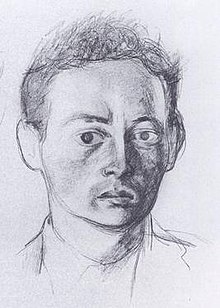John McGahern
[3] Born in Dublin, John McGahern was initially raised at Corramahon, a townland located just over a mile east-north-east from the small town of Ballinamore in the south-east of County Leitrim.McGahern married his first wife, Finnish-born Annikki Laaksi, in 1965 and in the same year published his second novel, The Dark, which was banned by the Irish Censorship Board for its alleged pornographic content along with its implied sexual abuse by the protagonist's father.Due to the controversy which was stirred by the book's publication, McGahern was dismissed from his teaching post and forced to move to England where he worked in a variety of jobs, including on building sites, before returning to Ireland to live and work on a small farm that he bought near Fenagh, a village near Ballinamore, in the south-east of County Leitrim.[22] McGahern's six novels, drawing inspiration from personal life experience, detail the trials of developing a sense of self in mid-twentieth century Ireland.Young Mahoney's attitude towards his father evolves over the large timespan covered within the novel from fear and hatred towards greater acceptance.Like McGahern himself, Patrick had promised his mother that he would become a priest and, as he is unable or unwilling to do so, instead becomes a schoolteacher (often referred to as "the second priesthood" in mid-twentieth century Ireland).As with McGahern's previous novel, this work treats the subject of death by cancer – the protagonist's aunt in this case is dying in hospital – as well as visits to rural Ireland.The book shows a detailed and understanding portrayal of a hardened, and unapologetically idealistic, protagonist in the figure of an ageing Moran.Though Moran's presence surely dominates the novel, the positive attributes of his stern moralism and sense of self-worth are passed on to his children, who become successful adults (both emotionally and financially) in both Dublin and London alike.Most of the violence of the father figure has disappeared now, and life in the country seems much more relaxed and prosperous than in The Dark or Amongst Women, as McGahern now writes in a twenty-first century Ireland.One of McGahern's best-known short stories, "Korea", was made into a feature film of the same name directed by Cathal Black and produced by Darryl Collins in 1995.



DublinBallinamoreCounty LeitrimMater HospitalThe BarracksThe DarkThe PornographerAmongst WomenThat They May Face the Rising SunNational SchoolCootehallPatrick SwiftThe ObserverThe GuardianSamuel BecketttownlandCounty CavanprovincialConnachtUlsterSergeantLough GownaIrish Civil WarGarda SíochánaTrinity College, DublinCounty RoscommonPresentation BrothersCarrick-on-ShannonLeaving CertificateSt Patrick's College of EducationDrumcondraClontarfDeclan KiberdUniversity College, DublinThe Most Rev.John Charles McQuaidArchbishop of Dublinbanned by the Irish Censorship BoardFenaghHugh LeonardCatholic ChurchIrelandIrish War of IndependenceMohillAndrew MotionColm TóibínEamonn McGrathFrenchAosdánaOrdre des Arts et des LettresColgate UniversityUniversity of Notre DameUniversity of VictoriaDurham UniversityGreat BritainNUI GalwayIrish Arts CouncilMan BookerTrinity College DublinUniversity College GalwayBordeauxSt. Patrick's College, DrumcondraIrish PEN AwardHughes & Hughes/Irish NovelWayback MachineBooker PrizeIrish Novel of the YearInternational Dublin Literary AwardMemoirJames Joyceof the same nameThe New YorkerThe Irish PressThe AtlanticThe ListenerThe London MagazineEncounterThe Yale ReviewGrantamini-seriesTony Doylefeature film of the same nameCathal BlackCopenhagen Film Festivalfilm adaptationIrish Film & Television AwardsThe Queen's University of BelfastThe Irish TimesT. S. EliotO.S.I.Denis SampsonTheGuardian.com